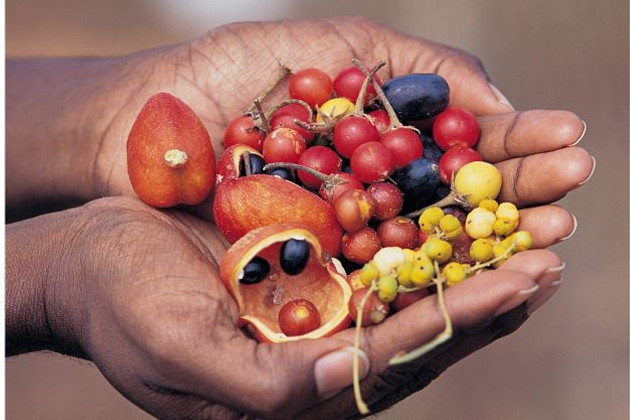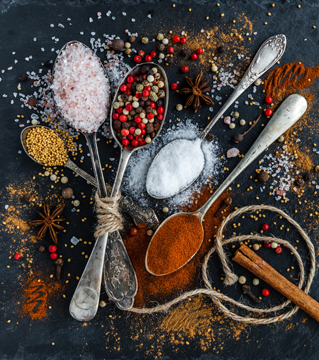AUSTRALIAN NATIVE FRUITS AND HOW TO USE NATIVE FRUIT POWDERS
Posted by Spice Zen on 25th Jan 2022
Australia has a unique biodiversity with its native flora and fauna. Indigenous Australians have foraged this native flora and fauna for nourishment and sustenance for thousands of years. Australian native food is also colloquially known as 'Bush tucker'. It includes kangaroo, emu, crocodile, witchetty grubs, native fruits like Davidson plum, finger lime, quandong or spices like aniseed myrtle, lemon myrtle or native lemongrass. The availability of native bushfood has declined due to several factors since the colonisation of Australia including introduction of non-indigenous food and destruction of indigenous land for western cultivation.
The food industry, across the globe, is craving for new flavours, exciting tastes, local and regional cuisines. Australian natives have seen a revival not only in the food industry but also in the landscaping, health and cosmetic industry. Australian natives are a hero ingredient in Michelin star kitchens and popular TV shows like MasterChef.
Australian native food is adding a distinct ‘Australian flavour’ to regional and international cuisines. The popular Australian native fruits include Davidson Plum, Kakadu Plum, Illawarra Plum, Finger Lime, Sunrise Lime, Lemon Aspen, Outback Lime, Muntries and Quandong. These nutrient-dense fruits from the Australian backyard are now considered ‘superfoods’. Let’s take a look at some of these Australian native fruits and how to use their fruit powders in our daily lives.
DAVIDSON PLUM
Davidson Plums are native to tropical rainforests in northeast Queensland and northern New South Wales (NSW). They are dark blue/purple in appearance and have a reddish-pink soft juicy pulp. Davidson Plum has an earthy aroma of rosella and stewed rhubarb with floral, earthy and musk notes. It is slightly astringent and intensely tart in flavour.
Davidson Plum is one of the most nutritionally powerful native fruits and has a high level of antioxidants with anti-inflammatory properties. It contains vitamin C, vitamin E, lutein, folate, zinc, magnesium and calcium. It has properties that may support eye health, diabetes, age-related macular degeneration, obesity, autoimmune and cardiovascular health.
Davidson Plum fruit powder is available at Spice Zen’s online store. It is freeze-dried to maintain its flavour and nutrients. This fruit powder gives a beautiful rich red colour to the dishes. Because of its strong acidic taste, the Davidson Plum is rarely eaten as fresh fruit. Instead, you can use it to flavour acai bowls, muesli, cocktails, juices, protein shakes, smoothies, sorbets, salads and yoghurts. You can also add it while baking and in chocolates, desserts, ice-creams, jams, sauces and relishes.
It is excellent as a meat glaze for duck, kangaroo, pork, and curing fish. It can help balance flavours in sweet dishes or desserts. You can enjoy it in a refreshing cup of either hot or cold tea.
KAKADU PLUM
The Kakadu Plum is known by many names such as Gubinge, Bush Plum, Billygoat Plum, Murunga and Kabiny Plum. It grows in the subtropical region of Kimberley (Western Australia), Northern Territory and Queensland. It is considered a 'gift of the Dreamtime', and Indigenous Australians have revered this bush tucker for many years because of its culinary, nutritional, preservative, and medicinal properties. It has a yellow/ green fruit with an oval shape and when ripe, quenches thirst with a boost of energy!
It is known for its antioxidant, anti-inflammatory, antiseptic, antimicrobial, enhancing immunity and anticarcinogenic properties. It is a rich source of vitamins, folates and minerals. It also has a high potassium to sodium ratio, which can help reduce hypertension.
It boasts of having the highest Vitamin C levels of any fruit globally, with 100 times more Vitamin C than oranges, 5 times more antioxidants than blueberry, and the same amount of folate as in broccoli.
Spice Zen’s Kakadu Plum powder is made from wild-harvested plums of the Kimberley region of Australia that are freeze-dried to retain the flavour and nutrients. It has an aroma of stewed apple and pears with floral-musky notes. It is slightly astringent and tart in taste with a strong stewed fruit flavour intensity.
You can add Kakadu Plum powder to juices, smoothies, acai bowls, muesli, shakes, and sorbets. Sprinkle it over your salads, puddings or just add it to your water bottles. You can also use it in jams, sauces, relishes, preserves, baking, desserts, and ice creams. To add an exotic touch, you can sprinkle it over seafood and chicken. Add Kakadu Plum powder to your homemade face masks and cosmetics.
FINGER LIME
Finger limes grow in the lowland subtropical rainforests in southeast Queensland and northern New South Wales. This native lime looks like a regular lime rolled into a sausage shape and as the name suggests, is barely the size of a little finger. Yet this unusual citrus (whose skin colour ranges from emerald green, to purple, crimson and black) is a nutritional giant! Unlike regular limes, the inside of a Finger Lime is packed with tiny translucent caviar-like pearls, and when popped, each one releases a delicious splash of tangy flavour. This has earned the fruit the nickname "citrus caviar or native caviar".
Finger lime has an aroma of fresh, citrus, slightly minty with fermented notes. It is refreshing, citrusy, sweet, tart with some astringency and bitterness.
Indigenous Australians have used Finger Lime for thousands of years for its nutritious and medicinal properties and for warding off diseases. It was applied topically as an antiseptic on sores. Finger limes are rich in Vitamin E, Vitamin C, potassium and folate.
Spice Zen’s Finger Lime powder is freeze-dried to preserve the flavour and nutritional value. With its lightly bittersweet taste, Finger Lime can be used instead of regular lemons or limes in practically any recipe. It is a natural flavouring for sweet and sour dishes. It is ideal for dressings, sauces, jams and marmalades. Use it in ice cream, sorbet, cookies, cakes and fruit bread. Sprinkle it on salads, fruits and mild cheeses. It pairs very well with Dukkah.
You can add it to seafood dishes like grilled fish, prawns and oysters or scallops with vinaigrette. It also works especially well in mocktails, cocktails, gin, vodka, mojitos, margaritas, martinis and other beverages. So, sit back and enjoy your favourite delicacies with a tangy twist.
SUNRISE LIME
Sunrise Lime is a cross of Finger Lime with Kumquat and Mandarin. This fruit is harvested during the winter months. The Sunrise lime fruit is small, pear-shaped with golden orange colour. This fruit can be eaten fresh (including the skin), or in the form of fruit powder. It is sweet, sour with a hint of bitterness. The juice is tangy and fresh with delicate floral notes of kumquat.
Sunrise Limes contain high levels of Vitamin C and Vitamin E. They are also rich sources of potassium and folate. It helps increase immunity, boosts eye health and vision, leads to healthy teeth and gums, and lowers blood pressure.
Spice Zen’s Sunrise Lime powder is a freeze-dried fruit that has been ground to retain all the nutrients and flavour. It has similar uses to Finger Lime. It is great in fruit dishes, beverages, and preserves. You can also use it in your baked goodies like cookies, biscuits or fruit cakes. Or just add to your spice rubs for a sweet, citrusy tang to your dishes.
LEMON ASPEN
Lemon Aspen, also known as Pigeon Berry, is found in tropical and tableland forests of northern Queensland to north-eastern New South Wales. This pale lemon coloured fruit has a rigid star-shaped core and a thin spongy flesh. Lemon Aspen fruit has citrus, tart, strong lemon taste with a hint of grapefruit. It has a tropical citrus aroma with notes of spice and eucalyptus. It is best enjoyed when slightly raw.
Lemon Aspen is a rich source of folate, iron and zinc. It contains magnesium, calcium, and has a superior antioxidant capacity than blueberries.
This fruit powder can be used as a fruit flavouring in sweet and savoury dishes or to replace any other lime. As it is very strong, just use it in small amounts. It is great with seafood and poultry.
Spice Zen Lemon Aspen powder is a freeze-dried fruit to retain all the nutrients and flavour. It can be used in syrups, sauces, dressings, relishes, chutneys and jellies. Like other native fruit powders, add it to juices, smoothies, cocktails, liqueurs, cordial or fruit wines. It can also be added with other spices for a tangy flavour.
OUTBACK DESERT LIME
Outback Lime, also known as Desert Lime is true native lime and belongs to the Citrus Glauca family. It grows in semi-arid areas of southwest Queensland, western New South Wales and South Australia. They are like small green grapes and the tree does not have any thorns. The Outback Lime has an intense rich lime flavour with an aroma of stewed fruit and freshly cut grass.
Outback Lime is a powerful source of antioxidants, Vitamin C and folate. It is a rich source of calcium, folate, Vitamin E and lutein. It also has a high potassium to sodium ratio, which may help to reduce blood pressure. Outback Lime can be used in both sweet and savoury dishes just like other native limes but it certainly packs a punch.
Spice Zen Desert Lime powder is a freeze-dried fruit to retain all the nutrients and flavour. It has a pleasant, sharp, slightly sweet citrus taste. Use it to flavour sauces, butter, jellies, jams, dressings, mayonnaise, aioli. Perfect in cordial, syrups, liqueurs and beverages. Add a zing or balance the flavours in your cakes, cookies, yoghurt, chocolate, ice cream and sorbets. Drizzle desert lime burnt butter over oyster or your seafood.
Now that you know all about the Australian native fruits, which of these are you going to try?
Do check out our herbs and spices collection and our Australian Natives collection. All Spice Zen products are gluten-free. They do not contain any added preservatives or flavourings.
Don’t forget to stop by our website.




